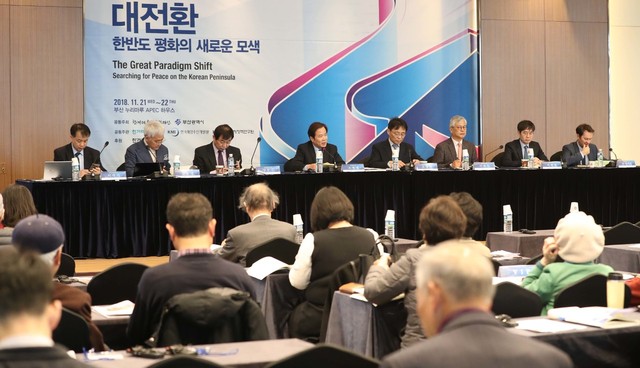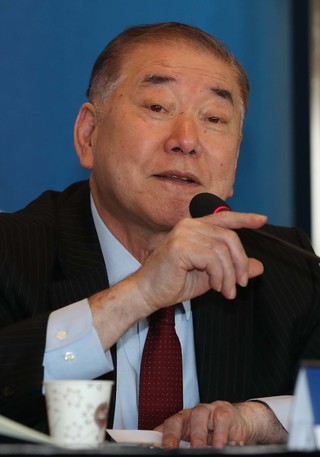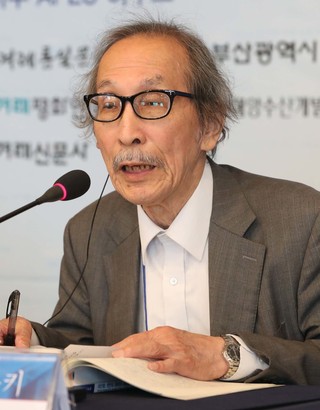 |
|
The 2018 Hankyoreh-Busan International Symposium in Busan on Nov. 21. (Park Jong-shik, staff photographer)
|
Keynote speakers emphasis imagination and looking ahead instead of clinging to past
The 14th Hankyoreh-Busan International Symposium, which focused on the topic “Seeking a Great Paradigm Shift and Peace on the Korean Peninsula,” kicked off its two-day schedule on Nov. 21 at Nurimaru APEC House in Busan.
“Peace cannot be created by people who fixate on a past of divisions and antagonism, distrust and hostility. Peace belong those who dream and imagine,” declared Moon Chung-in, keynote speaker and special presidential advisor for unification, foreign affairs, and national security.
“Imagination is peace,” he stressed.
Tokyo University Emeritus Professor Haruki Wada also emphasized in his keynote speech that “now is the time to dream.”
“In any case, the complete denuclearization of the Korean Peninsula cannot happen without dreaming,” he said.
Addressing current impasse between Washington and Pyongyang
 |
|
Moon Chung-in, special presidential advisor for unification, foreign affairs, and national security.
|
Coming ahead of an anticipated second North Korea-US summit and Seoul visit by North Korean leader Kim Jong-un that are poised to have a decisive impact on the peninsula’s future, the messages rang as an appeal from venerable South Korean and Japanese academics to continue the journey toward peace with bold imagination rather than shrinking in the face of practical difficulties.
Moon attributed the current impasse between Pyongyang and Washington to three main issues, namely their respective insistence on denuclearization before the loosening of sanctions and simultaneous denuclearization and loosening of sanctions; their differences on the matters of nuclear reporting and inspections and a declaration ending the Korean War; and the imbalance formed as North Korea-US relations have been slower to improve compared to inter-Korean relations in the wake of the Pyongyang Joint Declaration in September.
Speaking in opening keynote speeches and discussions at the Hankyoreh-Busan International Symposium at Busan’s Nurimaru APEC House on Nov. 21, Wada and Moon repeatedly stressed the importance of “imagination” to achieving permanent peace and denuclearization on the Korean Peninsula. Coming at a time when a breakthrough is urgently needed in the peninsula’s political situation, the remarks showed the two senior scholars representing South Korea and Japan to share the same basic position on the need to seek out new ways of breaking through rather than shrinking before obstacles. At the same time, they also differed in the concrete solutions they proposed.
US and Japanese involvement vs. accelerating inter-Korean relations
 |
|
Tokyo University Emeritus Professor Haruki Wada
|
Wada stressed “US cooperation and Japanese involvement” as necessary conditions for resolving issues.
“Without properly resolving issues of peace in Northeast Asia, no progress can be made in other issues either,” he said, adding that the US “must be included” in the “shared Northeast Asian house” (community) driving the establishment of peace in East Asia.
Wada went on to stress that Seoul should work to “persuade Japan to be a part of things,” suggesting that cooperation by South and North Korea and Japan could lead to the creation of a mechanism to guide peace between North Korea and the US as the US, China, and Russia also become involved.
Wada also responded to claims in the US that improvements in inter-Korean relations should not outpace those in North Korea-US relations. While he insisted on the need to “increase the tempo,” he also warned, “If we raise the pace too much, things will not work. It is extremely important to pace ourselves.”
Moon flatly rejected the calls for “slowing the roll.” Instead, he suggested inter-Korean relations could provide an impetus for North Korea-US relations, recalling the September summit in Pyongyang where the South and North Korean leaders ended a deadlock between the North Korea and the US that had emerged after a third North Korea visit by US Secretary of State Mike Pompeo in July.
He also responded to a somewhat pessimistic assessment from Dong-A University professor Won Dong-wook, who questioned whether progress could be achieved with the Korean Peninsula peace process amid the US-China battle for supremacy and the US’s East Asia strategy.
“South Korea’s autonomy vis-à-vis the hegemon that is the US all hinges on a national consensus,” Moon said.
“If the antagonisms between conservatives and progressives can be overcome and a national consensus can be formed, we can overcome [US opposition and controls],” he insisted.
“While we can’t avoid relying on the US in the short term, I think that once peace arrives on the peninsula, we will be able to establish a collective security regime in place of the alliance – a comprehensive security regime,” he added.
Responding to a question from a Busan resident on whether a suspension of hostilities set to begin on Dec. 1 following a Sept. 19 agreement to implement the Panmunjom Declaration in the military domain constitutes “unilateral disarmament,” Moon replied, “It is not disarmament, but an operational arms control measure to prevent unintended military clashes.”
Handong Global University professor Kim Joon-hyung, who took part in the debate, said the current moment may be a “last chance” to establish peace on the Korean Peninsula.
“We need to ensure that [the Korean Peninsula] does not become a stage for confrontation between powers [the US and China],” he said.
Acting as moderator, Ministry of Unification Institute for Unification Education director Baek Jun-kee said, “Rather than branding North Korea as a ‘loser in the Cold War,’ the wise thing would be to actively embrace it as an actor in East Asia and the global order and encourage its institutionalization.”
By Kim Ji-eun, staff reporter
Please direct comments or questions to [english@hani.co.kr]











